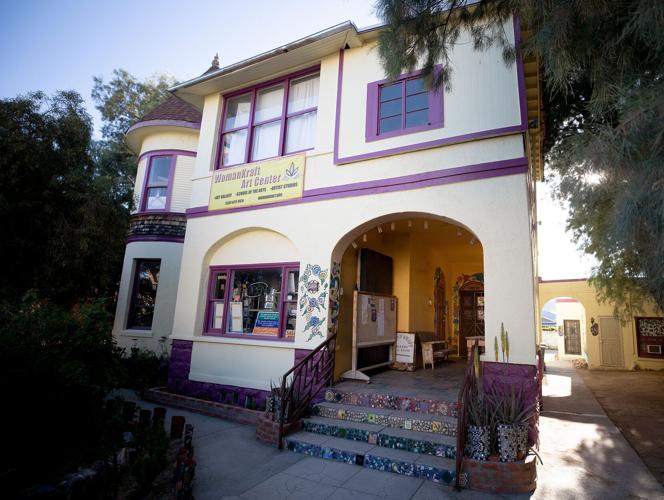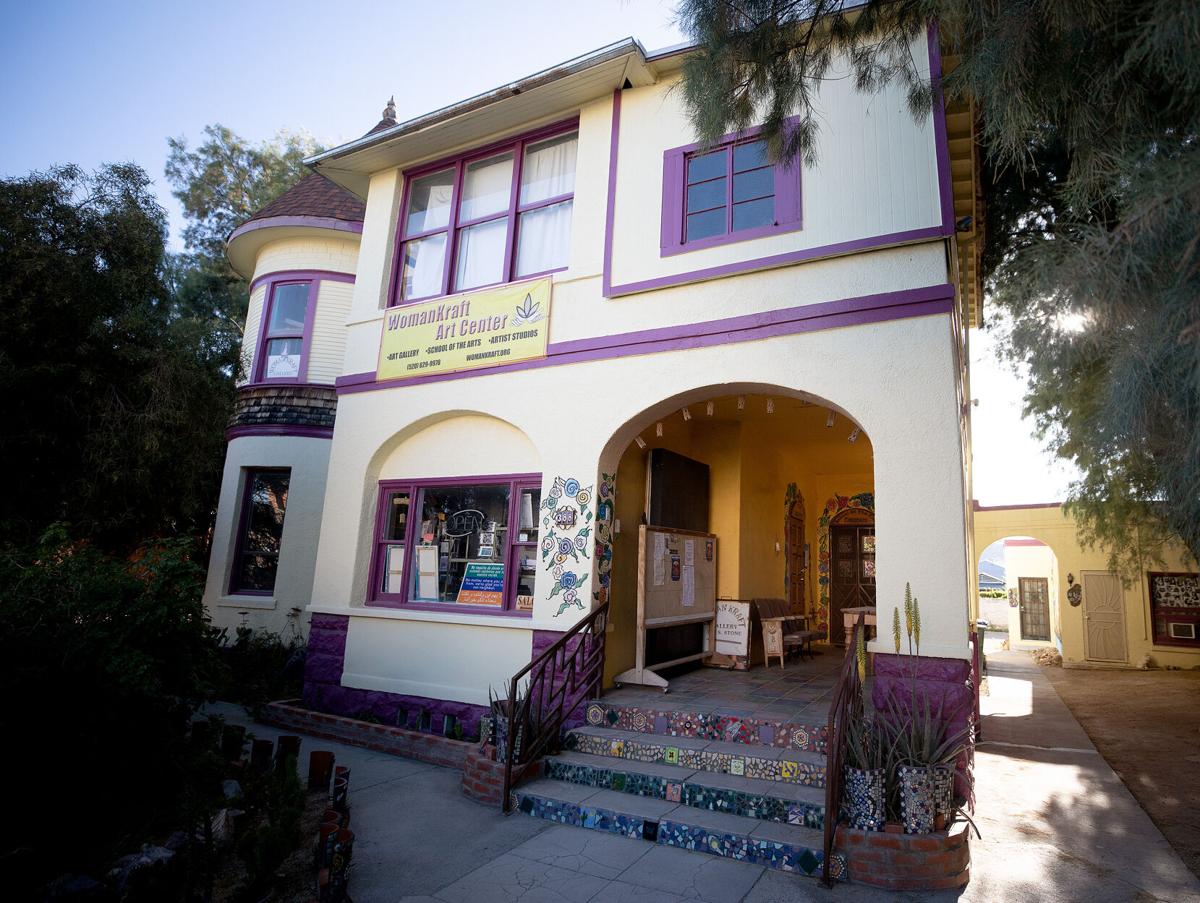When Terri McGuire moved to Tucson a few decades ago, she felt like she didn’t know who she was.
She had very little faith in herself and began feeling disconnected from her true self.
But that all changed when she walked into WomanKraft, a volunteer-run nonprofit dedicated to empowering local women (and other underrepresented groups) through art.
“When I walked inside of here, I felt like the house welcomed me home,” she said.
WomanKraft, which turned 50 this year, is housed in a 1918 Queen Anne Victorian home at 388 S. Stone Ave. The space is utilized as a workshop studio, gallery and even an all-natural beauty salon called The Sanctuary.
Over the organization’s last 50 years, hundreds, if not thousands of Tucsonans have strolled through the art-filled halls of WomanKraft and have found their creative home — a tradition that McGuire hopes continues for the organization’s next 50 years.

Artwork in the annual "Muse," show hangs in one of the main rooms at WomanKraft Art Center on April 16.
McGuire began taking art classes with Gayle Swanbeck, the current co-director of exhibits and School of the Arts at WomanKraft, in the mid-90s and credits Swanbeck with helping her find her passion for art.
She recalls a class where Swanbeck created ceramic statuettes of Venus of Willendorf, an ancient fertility figure that people worshipped thousands of years ago.
“I am definitely not built like a Barbie doll,” McGuire said. “And the Venus of Willendorf is not built like a Barbie doll either. And it just kind of hit home for me. So, at the same time that she's trying to convince me that I'm an artist. I'm processing this thing about how I'm built like a fertility goddess. Am I a goddess?”
McGuire continued taking classes and workshops with Swanbeck and eventually, her art was displayed in the WomanKraft "castle." Back then, her first piece of art sold before the gallery’s reception even started.
“It's (WomanKraft is) important to me. And it's important to the community. I 100% believe in WomanKraft and what WomanKraft does,” she said. “And when I came here, I didn't know who I was. I didn't have any faith in myself at all. And little by little Gayle worked with me. And she's like, ‘Terri, you're an artist.’ … So today, I can tell you that I'm an artist and I'm a goddess. And I know who I am.”
McGuire’s story is just one of many from countless individuals of all backgrounds, including those with bouts of adversity, who have found a creative outlet and second home at WomanKraft.

McGuire
Since her time at the organization, McGuire has had many roles including student, instructor, workshop facilitator, greeter at gallery receptions and now co-director of exhibits and School of the Arts alongside Swanbeck.
As a co-director of the organization, McGuire hopes to see more of the next generation find themselves at WomanKraft.
“That's what we do. When I said I felt like the house welcomed me home… This is home for a lot of people,” McGuire said. “And they don't have to have a lot in this world. We embrace them. We don't care who you are. We don't care where you come from. We don't care how much money you do or don't make, it doesn't matter. You're a part of WomanKraft as a supporter, as an artist and as an instructor or whatever.”
'Every time we've hit a crisis, we burned like a Phoenix and risen from our own ashes and it's always gotten better.'
WomanKraft, which translates to woman “power” in German, was founded in a kitchen by seven local women in 1974.
From the very beginning, a grassroots approach has been used to keep the organization moving forward by often relying on grants, fundraising and donations.
WomanKraft currently utilizes a membership-based model where people can pay $30 a year to become an official member, which helps support the organization’s overall mission of empowering locals through art.
Members and non-members can also take classes and workshops on various topics like creating beaded jewelry, stained glass mosaics and even writing workshops, for a fee, typically ranging from $20 to $25 per class. Classes can book up fast as there is a four-person limit.
You can find a list of upcoming workshops on WomanKraft’s website or in their newsletter, “The Castle Voice.”
The organization used to host other activities like plays at the “castle,” which McGuire wants to bring back, along with bingo night.
WomanKraft also hosts five gallery exhibits a year for two-month periods. The next gallery reception will be from 7-9 p.m. on Saturday, June 1. But visitors can check out the free gallery weekly from 1-5 p.m. Thursday through Saturday.
One person who has been with the organization for nearly its entirety is Swanbeck, who moved to Tucson from Michigan in 1975.
She says the organization has taught her how to be a viable businesswoman and artist.
“That's why I'm still here, and at 73, I’ve been making my living as an artist and as a teacher of art outside of the school system,” she said. “It's because I had these mentors who gave me this invaluable education. And that's one of the reasons why I've stayed is so that I can help other emerging artists and underexposed artists learn how to promote themselves in a safe environment where they're not looked down upon.”

Little paintings by Sheron Gomez are on display in one of the rooms at WomanKraft Art Center.
Throughout Swanbeck’s 45-plus-year journey at the organization, she says she’s just about seen it all, including plenty of changes.
Over the years, WomanKraft has experienced changes in funding and location. In the early 1990s, they moved to their current location at the “castle” along South Stone Avenue, a building they now own.
Despite the obstacles, the individuals behind WomanKraft are determined to keep the art organization alive in the community for years to come. By the community, for the community.
“It just comes back to the idea of it being a community effort, a grassroots (effort) in the community,” Swanbeck said. “No one did it because they were getting patted on the back or everyone was going ‘Wow, you're so wonderful.’ We were doing it because we saw that it was wonderful and it's really great to be a part of something bigger than yourself. … And every time we've hit a crisis, we burned like a Phoenix and risen from our own ashes and it's always gotten better. And that's what I think will happen in the next 50 years for WomanKraft. There'll be crises these days and we'll meet them and we'll change when we need to.”
To find out more about WomanKraft, check out their website.
The Women's Plaza of Honor, dedicated in 2005 on the west side of the University of Arizona campus, features arches and a monument that highlight important women and their contributions to the university.
This landmark was built with the help of Edith Auslander, a former UA vice president and co-founder of the National Association of Hispanic Journalists, who died this month. Video by Pascal Albright / Arizona Daily Star








